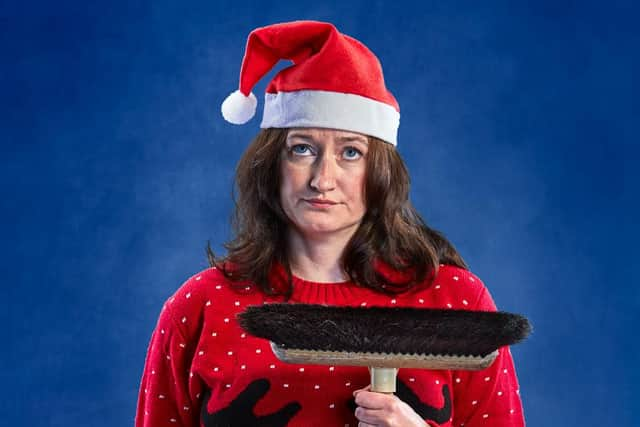Stagehand takes centre stage in Lyceum Christmas show


You can see why someone might feel down about Christmas. Last year, celebrations were all-but cancelled. This year, the fog of Covid uncertainty has yet to clear. Anyone who has lost someone close to them in the past two years might find it hard to get into the festive swing of things.
That, at any rate, is the case for the woman at the heart of Christmas Dinner, the seasonal entertainment by playwright Robert Alan Evans at Edinburgh's Royal Lyceum. Played by Elicia Daly, she is a stagehand called Lesley who has had, as the theatre puts it, a "horrible year".
Advertisement
Hide AdWhen the show starts, she is all set to shut the theatre down for the night and pretend Christmas isn't happening. She'll make do with a turkey sandwich and be done with it.
"The level of pain that people went through last year was unbelievable," says Gill Robertson, artistic director of Catherine Wheels, the play's co-producer. "The loss, the pain and the discombobulation has affected Lesley. She has lost her gran and has had a year of pushing it down, not sharing her grief and getting on with her work."
The creatures in the costume cupboard, however, have ideas of their own. When midnight strikes, familiar characters such as Snow White and Cinderella emerge from storage on a mission to cheer Lesley up. How to do it? In true theatrical style, they put on a show.
"They're ghosts, but they're bonkers," says Robertson. "The show they create is bonkers too, but then they end up telling a lovely story for Christmas."
Having Evans on board as playwright keeps the fun quotient high. "What I love is that if you're in a room with Rob and he's writing, he is killing himself laughing," says Robertson. "He sees the world in a surreal way and he loves a bit of anarchy and that all comes through. His pleasure in writing is what makes his shows really alive."
It's no coincidence Christmas Dinner is set in a theatre. Among the many privations of lockdown was the lack of opportunity to enjoy a show together. Audiences of all ages have missed the chance of a shared experience. In the darkest days of lockdown, theatres seemed to become repositories of cultural memory, empty spaces haunted by shows they had once hosted. For Robertson and Evans, it felt right to remind us of the theatrical joy we have missed.
Advertisement
Hide Ad"When the audience come in, the theatre has been locked up," she says. "The Christmas sprits arrive and they are the ones who recognise that the theatre is sad and it needs a show. It needs a proper story to bring it alive again."
The same is true for us in the audience. "It feels like we need heartfelt robust storytelling that pulls us into other worlds," she says. "We're trying to surprise the audience and then to draw them in."
Advertisement
Hide AdRobertson revels in Christmas Dinner's "songs, dances and mad vegetable costumes", but as a specialist in children's theatre, she knows younger audiences can cope with darker themes just as well as adults – sometimes better. She recalls a Danish show called Goodbye Mr Muffin in the Imaginate festival that told the life story of a guinea pig, now deceased. At the end, the grown-ups were in bits. The children, by contrast, just wanted to play with the puppet.
"Making children's theatre you're always thinking about your audiences," she says. "And you know they can handle lots. It's the adults that get scared. You've got somebody going through deep grief in Christmas Dinner, but they are transformed through the show and, by the end, you've got hope, happiness and Christmas spirit."
Delighted to be back in the rehearsal room after the pandemic, she has taken advantage of the Royal Lyceum's decision to delay its staging of The Snow Queen until next year. By then, it should be practical to stage a large-scale show again, but for now, there is a chance to present an unfamiliar play on the main stage.
Just as the play itself is a response to the last two years, so the break in normal service has given Catherine Wheels a reason to take stock. Across the industry, discussions have raged about theatre's social responsibility and its environmental impact. Robertson, for one, is returning to action more determined than ever to correct imbalances.
Like the Tron Theatre's recent environmentally friendly production of The Tempest, the set and costumes for Christmas Dinner have come almost entirely from existing stock. When auditioning for future productions, Catherine Wheels will not expect actors to show up at their own expense. And Robertson plans to revive The Story of the Little Gentleman for a production in China without setting foot in the country: she intends to do it all on Zoom.
"There was so much talk last year of coming back better, really looking after people, and thinking about equality, diversity and inclusion," she says. "It feels like it's happening. With people who are in paid jobs, you just have to pay people and there has to be a line in your budget. It’s like with environmental stuff; there just has to be money there for it. And you have to think carefully about whether you need to get people in, whether you'll travel to them and thinking about them first rather than you. On all those levels, that will happen."
Advertisement
Hide AdChristmas Dinner is at the Royal Lyceum, Edinburgh, from 6 December until 2 January, https://lyceum.org.uk/
A message from the Editor:
Thank you for reading this article. We're more reliant on your support than ever as the shift in consumer habits brought about by coronavirus impacts our advertisers.
If you haven't already, please consider supporting our trusted, fact-checked journalism by taking out a digital subscription at https://www.scotsman.com/subscriptions